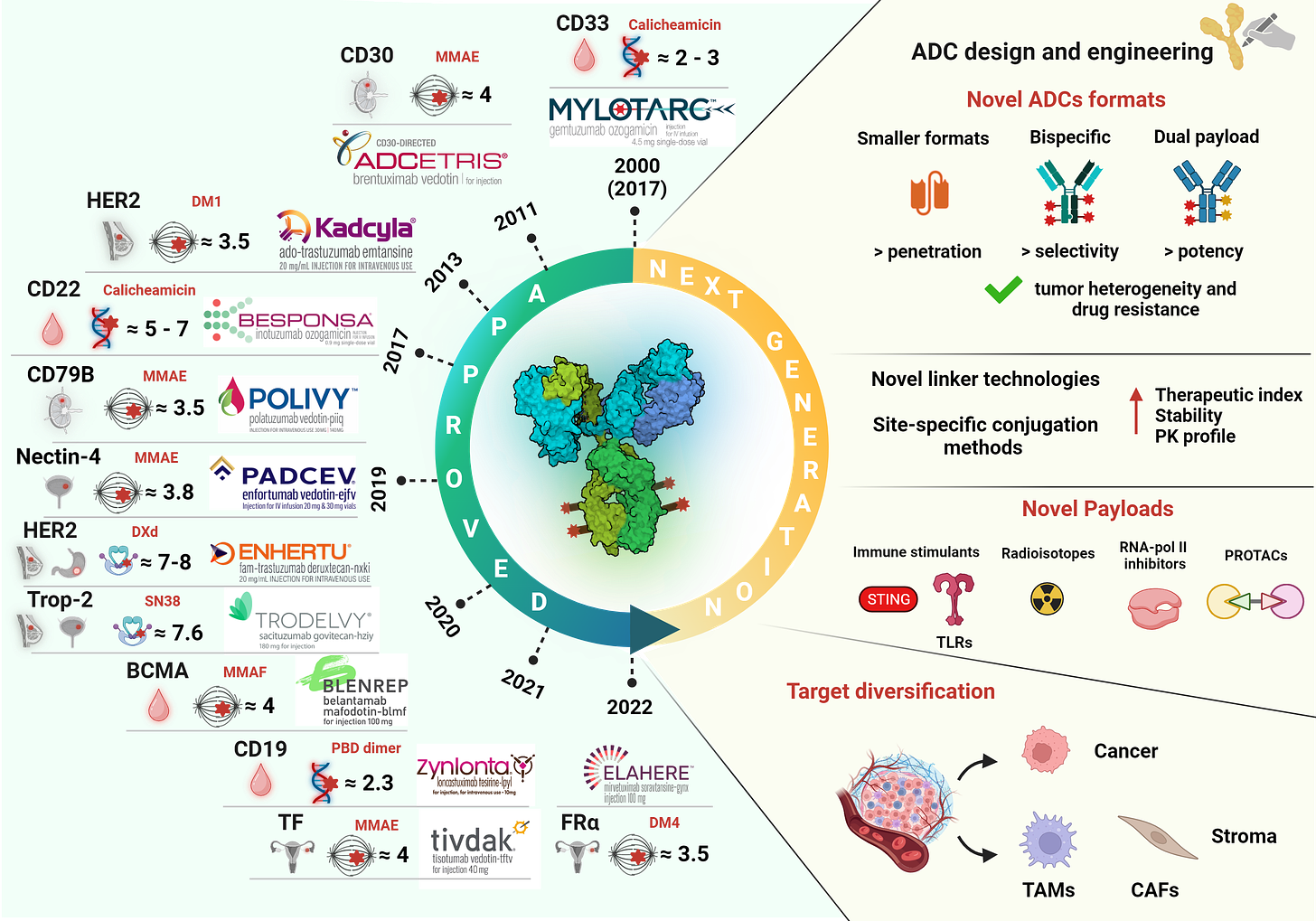A Landscape of Novel Antibody-Drug Conjugates
ALSO: Gen AI and the Next Wave of Protein Design (Video); This AI platform Beats AlphaFold in Predicting Protein-ligand Structures; 9 Innovative Life Sciences Companies to Watch in 2024; and more...
Hi! I am Andrii Buvailo, and this is my weekly newsletter, ‘Where Tech Meets Bio,’ where I talk about technologies, breakthroughs, and great companies moving the biopharma industry forward.
If you've received it, then you either subscribed or someone forwarded it to you. If the latter is the case, subscribe by pressing this button:
This week’s newsletter is brought to you by BiopharmaTrend.com.
The company created “The State of AI in the Biopharma Industry,” which is a unique resource for tech scouting, competitive intelligence, and strategizing about artificial intelligence (AI) for pharma and biotech.
Watch a brief report overview below (under 4 minutes of watch time) 👇
Now, let’s get back to today’s topics!
Weekly TECH+BIO highlights:
💰 VantAI strikes $674M deal with BMS on AI-driven molecular glues
🛑 Prominent AI-biotech Exscientia fires Co-founder and CEO Andrew Hopkins for inappropriate relationships with employees; Chief Scientific Officer Dave Hallett steps in as interim CEO.
💰 BioAge secures $170M in oversubscribed Series D financing for obesity and metabolic disease therapeutics, advancing Phase 2 trials of azelaprag with Lilly’s Zepbound.
The Growing Diversity of Antibody-Drug Conjugates in Cancer Therapy
Since the first antibody-drug conjugate (ADC) was approved in 2000, the ADC field has seen significant transformation. It has revolutionized treatment for advanced-stage cancers, including solid tumors.
I have recently come accross a solid review article where two scientists from Denmark, Dr. Virginia Metrangolo and Dr. Lars Engelholm delve into the rapid advancements and breakthroughs in ADCs.
These innovations in design and development make ADCs highly adaptable. They can be precisely tailored to match tumor biology, promising a new era of personalized cancer therapy.
According to authors, currently, 14 ADCs are available globally, with over 100 in clinical trials. This targeted approach is set to transform cancer treatment. Notably, 7 ADCs target solid tumors, expanding the range of treatable cancers. This also introduces new possibilities for combination therapies against the toughest cancer types.

Navigating Next Wave of Protein Design with Elise de Reus from Cradle
Cradle, a Dutch-Swiss biotech startup founded in 2021, is advancing the field of protein design by leveraging generative artificial intelligence (AI).
The company, with its headquarters in Delft, the Netherlands, and additional operations in Zurich, Switzerland, has developed a web-based software platform aimed at accelerating the R&D pipelines in biotechnology.
This platform enables scientists and experimentalists to design and engineer proteins more efficiently by breaking down traditional data roadblocks without the need for specialized knowledge in bioinformatics or machine learning.
In November 2023, Cradle raised $24 million in a Series A funding round, bringing its total funding to $33 million. The round was led by Index Ventures, with participation from Kindred Capital and notable angel investors such as Chris Gibson, co-founder and CEO of Recursion, and Tom Glocer, former CEO of Thomson Reuters.
The company plans to further expand its team and build out additional laboratory and engineering facilities in Amsterdam in 2024.
Since coming out of stealth mode in 2022, Cradle has onboarded several industry partners, including Johnson & Johnson Innovation, Novozymes, and Twist Bioscience, and is now working on over a dozen of R&D projects.
These projects span a wide range of protein modalities, such as enzymes, vaccines, peptides, and antibodies, aiming at improving various protein properties like stability, expression, activity, binding affinity, and specificity.
Cradle's technology has shown to double the speed of most projects compared to industry benchmarks, demonstrating its potential to significantly accelerate the design and optimization of proteins
In this engaging episode, I sat down with Elise de Reus, co-founder at Cradle, and we talked about how the field has evolved post-AlphaFold and the role Cradle plays in pushing the boundaries of protein optimization using gen AI.
The discussion also touches upon the inherent challenges of melding AI with biological research, particularly the validation of AI-generated designs in the wet lab. Elise elaborates on Cradle's approach to navigating these obstacles, underscoring the broader implications of their work across industries, from pharma to food sustainability.
A significant part of our conversation revolves around the evolving career landscape in biotech and AI.
Elise passionately speaks about the burgeoning opportunities for information technologies and machine learning professionals within life sciences. She encourages those with a tech background to venture into bioengineering. She highlights the interdisciplinary nature of modern scientific breakthroughs and Cradle's own diverse team as prime examples of the innovation that cross-disciplinary expertise can foster.
Watch the full episode:


